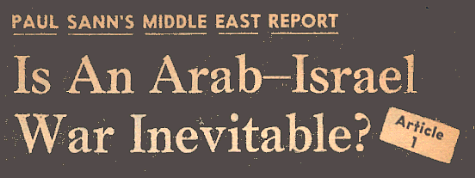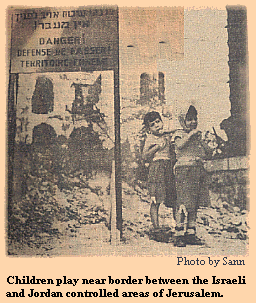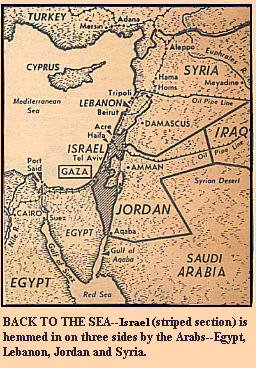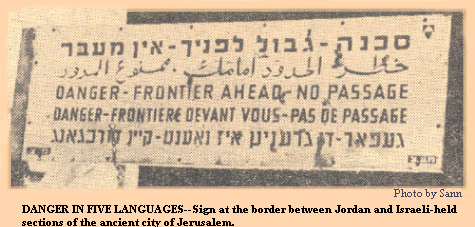 By PAUL SANN
By PAUL SANN

 War is perilously close in the Middle East.
War is perilously close in the Middle East.
It is so close that any spark could light the fuse--any one of many sparks:
Another "incident" on the Gaza Strip, the no-man's land between Egypt and Israel.
Another foray into Israel from Syria or Lebanon, or perhaps a retaliation strike going the other way.
Another burst of fire on the crazy-quilt line that splits Jerusalem between Jordan and Israel.
Or perhaps a clash on the water--in the Gulf of Aqaba on the Suez Canal, where Arab shore batteries seal off Israel's trade lines to Africa and the Far East.
Take your pick.
What happens tomorrow or the day after is your guess or mine.
My guess is that peace can't happen--unless it comes from the outside.
In the Middle East the two colliding worlds cannot so much as sit down and talk about their troubles.
The Arabs say there is no such state as Israel. It is just an awful dream to them. They tried to chase it away with bullets and bombs in 1947 and again in 1948 and into 1949 but it was a dream 2,000 years old and it would not run from fire and flame.
Indeed, it had no other place to go.
The homeland was the last haven of the Jews, the only door fully open to the dispossessed. They had to stay.
 So the Arab invaders withdrew, beaten and filled with shame and anger, and resolved to come back another day. It is all on the record, which this series will carry. The Arabs said they would come back and push the unmentionable neighbor into the Mediterranean.
So the Arab invaders withdrew, beaten and filled with shame and anger, and resolved to come back another day. It is all on the record, which this series will carry. The Arabs said they would come back and push the unmentionable neighbor into the Mediterranean.
You can't settle this kind of thing around the table because you can't sit down with a ghost. You have to swing at it.
That's why peace must come from the outside.
It must come from the United Nations--maybe another Ralph Bunche, who commanded some kind of miracle and patched together the armistice of 1949 and stopped the senseless slaughter in the Holy Land for a while.
Or it must come from the West--maybe in a collective security pact hammered out by the U.S., Britain and France.
Or it must come from East and West--maybe in a collective security pact fashioned by the Big 3 and the Russians.
 They're all long shots, of course, but there are no quick cures in the Middle East itself, because there on the edge of inferno no one is wasting any energy talking about peace.
They're all long shots, of course, but there are no quick cures in the Middle East itself, because there on the edge of inferno no one is wasting any energy talking about peace.
They're talking about war.
They're talking about who cast the first stone.
They're talking about whose fault it's going to be if the fuse is lit.
They're talking about everything except how to settle the seven-year argument short of all out battle. This is the most striking fact I encountered in two weeks in Israel and Egypt.
The wonder is that no war has started before now.
Why hasn't it started?
The answer is that the Arab world has not been able to train its armies and gear its war machines to match Israel's ever growing strength.
Israel is an armed camp.
Israel has built its ragged battalions into a solid, hard-as-steel fighting force with boundless spirit.
Israel, in a sense, has drafted everybody. It has a small but strong regular army and the cream of its youth--boys and girls--in uniform. It has all its able bodied men up to the age of 45 on reserve and drilling regularly. It has on call everyone who can steer a truck or a Jeep, or handle a tank, or pilot a plane, or hold a rifle, or maybe just throw a grenade.
 Israel says to the world that in a new-born nation of 1,700,000--and you need to take out the elderly Jews who came to the homeland only to die, and those who are to young, and the sick and weary, and the 10 percent that happens to be Arab--it must be prepared to field a force of 250,000 because it believes it may have to fight for its life.
Israel says to the world that in a new-born nation of 1,700,000--and you need to take out the elderly Jews who came to the homeland only to die, and those who are to young, and the sick and weary, and the 10 percent that happens to be Arab--it must be prepared to field a force of 250,000 because it believes it may have to fight for its life.
Israel says it has to maintain such a force, in the face of the monumental task of wringing a state and a living out of the Biblical wastelands, because the first war never really ended and the Arabs always threatened to come back for their much heralded "second round."

The Arabs in turn point to all this and tell you Israel is poised to attack them.
The Arabs tell you they want to live in some kind of peace but Israel won't let them.
The Arabs tell you that Israel--a speck on the Middle Eastern map, no bigger than New Jersey--has its blueprints ready to invade and occupy all the Arab states with their population of 50,000,000 (or more).
Egypt's Soldier-Premier, Gamal Abdel Nasser, told me this in Cairo and I asked him how such a small nation as Israel could occupy the vast and sprawling Arab world.
Nasser smiled and shrugged. He said it just happened to be so and that's why he's trading Egyptian cotton and rice (and some precious cash) for heavy arms from the Czechs.
So the lines of the two camps coincide on one big point: each side says the other is getting set to throw the first punch.
Israel says Nasser will attack when he has (a) collected the Stalin tanks and jet fighters and medium bombers due on his made-in-Moscow deal and (b) trained his men to use them, maybe in one or two or three years.
Nasser says Israel won't sit back and wait for him to get strong.
I asked him whether the Israelis were right when they said the Communist weapons would give the Arab world an overwhelming superiority in striking power.
"Everyone is trying to be weaker in public," Nasser said.
Israel doesn't pretend to be weaker--in public or otherwise--at this moment, but says that Nasser's build-up may tip the scales very fast. The Israelis say they can win a war if it is fought now.
The Arabs agree with them.
 That's the only reason why the '49 truce and the fresh cease-fires since then--all shredded by bullets and even by mortar and a dogfight in the skies--have held together short of all-out war.
That's the only reason why the '49 truce and the fresh cease-fires since then--all shredded by bullets and even by mortar and a dogfight in the skies--have held together short of all-out war.
That's why the showdown did not develop in late August or early last month when the Gaza Strip ran with blood on both sides through 10 days of the worst fighting since the State of Israel was proclaimed.
There was no war because Egypt's military dictator had to be content to count his dead and have another cease-fire.
It was a hard decision for Nasser to make for two reasons:
I--The Egyptian casualties included 35 of his own pet border commandos, the Fedayeen (Self-sacrificers), wiped out by an Israeli armored column in their headquarters at Khan Yunis on the night of August 31.
II--More important, the hot-heads in Nasser's junta wanted war that night. They had an army on the Gaza plain by then and so did the other side. They wanted the button pushed. Nasser wouldn't press it.
He didn't think he could win.
He wanted to buy time--and some heavy stuff, too. He cooled off the zestful young officers who helped him mount a revolution in Farouk's sick country and wanted to help him with that other item of pending business, in Israel.
Nasser says he doesn't know whether he would try to stop the whirlwind next time.
"I don't know what will happen if another Khan Yunis happens," he told me, "it is not easy for a man to decide . . ."
____
TOMORROW: Arab vs. Jew--How Israel's case stacks up.
|

